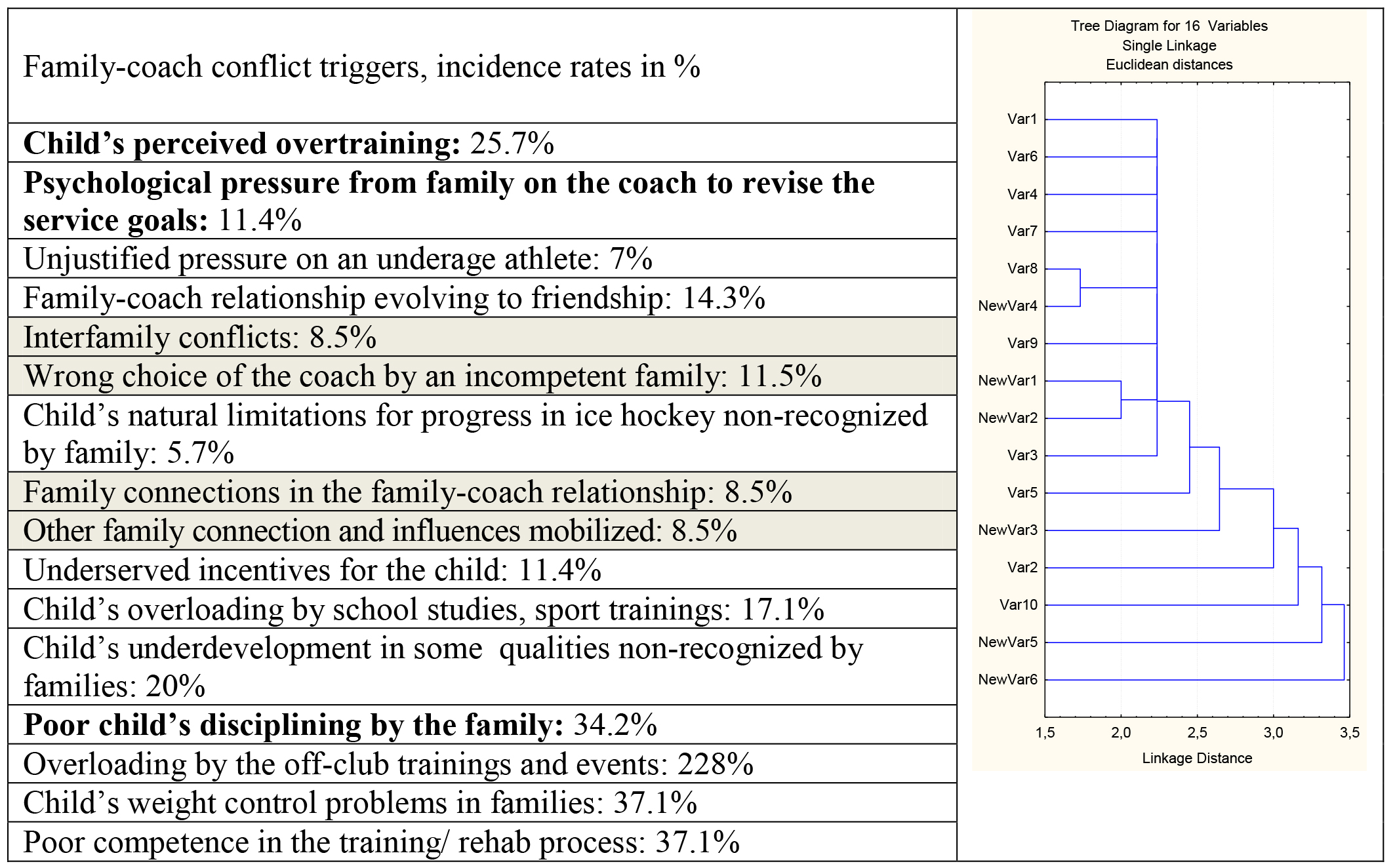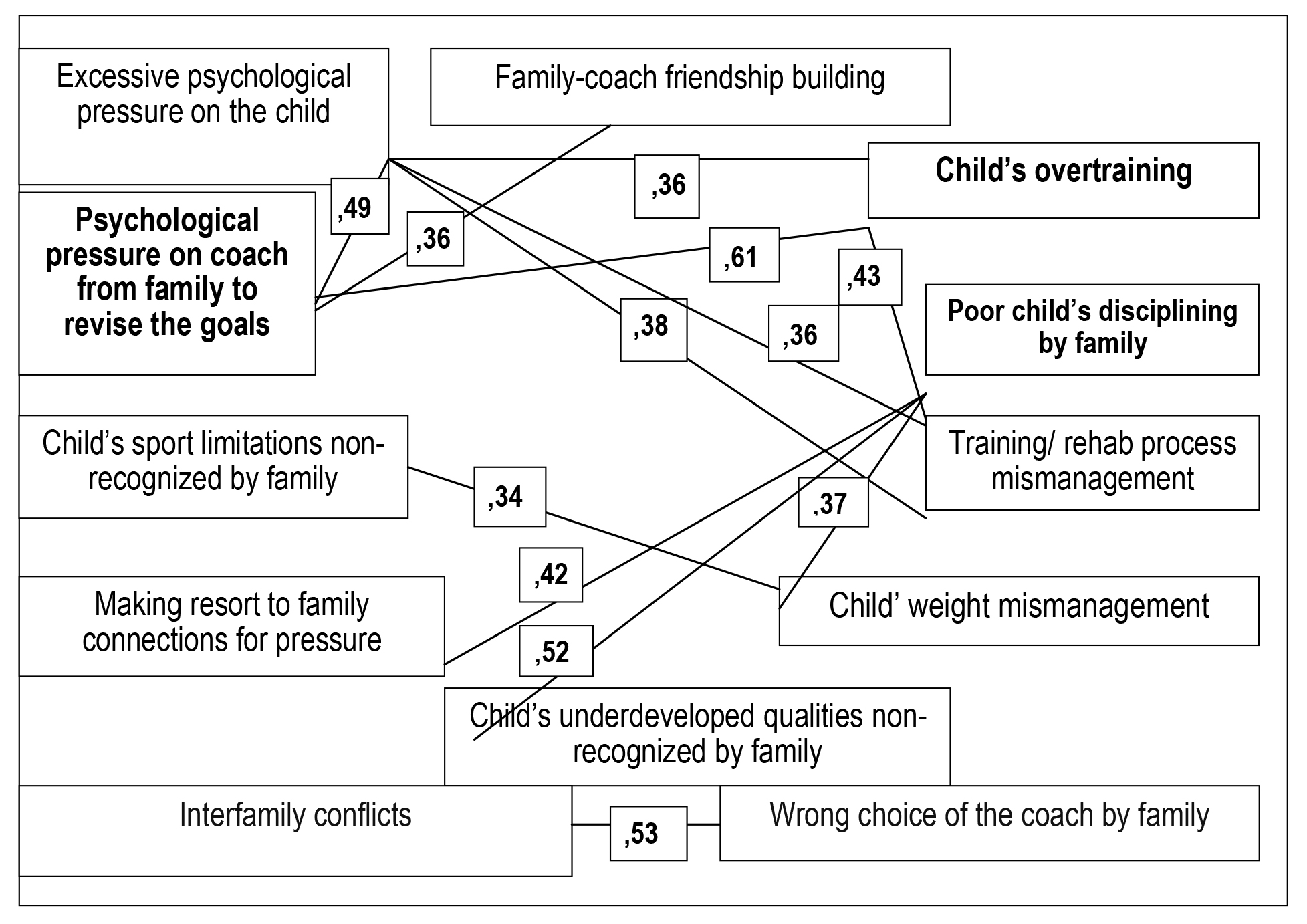Ways to improve family-athlete-coach relations and their conflict triggers
ˑ:
Master's student K.S. Tashkinov1
Dr.Hab., Associate Professor T.K. Kim1
Dr.Hab., Associate Professor G.A. Kuzmenko1
1Moscow State Pedagogical University, Moscow
Keywords: beginner ice hockey players, coach, family, sport team, conflicts, cooperation, education.
Background. It is a common knowledge that a coaching service requires a range of personality and professionally valuable qualities critical for success of the theoretical and practical trainings and competitions. Management and communicative qualities and skills are ranked high on the list of the coach’s priority competences since a coaching service requires being in a permanent contact with the trainee far beyond the frame of the sporting domain as such. Thus the coach-family relationships need to be well designed and managed since lately the sport community have reported the growing concerns about the excessive and not always justified interference of families in the training process with the inevitable damage for its quality in particular and healthy climates in the sport teams and communities on the whole. Detrimental effects of such interference have been demonstrated by the study report by T.K. Kim and G.A. Kuzmenko who underlined the particularly harmful effect of pressure from family members having little if any competence in the theoretical and practical trainings albeit still influential in the child’s sport identification and excellence domains [5,6].
Sport analysts have attempted to outline the potential solutions for the above problems. Thus T.N. Bushuyeva gives a special priority to the coach’s authority building aspects in the efforts to improve the competitive performance in junior sports [2]; R.A. Abdurakhmanov emphasizes the psychological culture of the process actors [1]; N.A. Voronov analyzes benefits of the adaptability improvement strategies in sports [3]; and G.B. Gorskaya prioritizes the motivations-centered climate in the sport teams [4].
Since the athletes’ families are generally poorly competent in the relevant general and sport-specific culturing issues, the coaches have to take efforts to update them on these issues at sacrifice of the training/ competitive service, young athletes’ motivating and team building activity. The personality resource of the coach, therefore, has to be partially wasted for families with detriment to the theoretical and practical training service; although such efforts, on the other hand, still give the means to improve the professional coaching service design and management aspects by the family support winning and their opposition minimizing elements.
Objective of the study was to analyze benefits of an education psychology prioritizing model for athletes’ families to scale down the potential conflict triggers based on correlations of the identified dependable causes and effects, with the potential conflicts of interests prevented by reasonable constructive businesslike communication to work out the best sport progress trajectories for the underage players.
Methods and structure of the study. The study was run at the Krylya Sovetov Ice Hockey Team training center, with 38 young athletes (born in 2012) and 10 their coaches sampled for the study. The study was designed to find by a questionnaire survey the reasons for and triggers the families’ oppositions, explore the potential conflict issues and facilitate the psychological and educational consulting service to the families to scale down tensions in the family-athlete-coach relationship; with the identified problems analyzed by the relevant semantics/ cluster/ factorial/ correlation analytical tools.
Results and discussion. Cluster analysis of the triggers for the family-coach conflicts in the ice hockey team showed the scale and origins of the problems: see Figure 1.
The key triggers for the family-coach conflicts were found dominated by the psychological pressure from family on the coach to revise the service goals (0,712); and the child’s overloading by the maximum-intensity excessive trainings (0.753). It should be mentioned that families tend to clear themselves of any responsibility for the child’s overstresses to put the full burden of the responsibility on the coach (0,700). The factorial analysis also found the poor child’s disciplining by families by requirements, responsibilities and prohibitions (– 0,767) of high detriment to the quality of the coaching service and for the family climate on the whole.

Figure 1. Family-coach conflict triggers with the incidence rate, as found by the cluster analysis

Figure 2. Correlation analysis of the family-coach conflict triggers (Correlations (Spreadsheet9), with the highlighted correlations significant at p<0.05 (n=35); with the case-wise deletion of missing data
The study found correlations of the reasons for the family-coach conflicts (see Figure 2) to offer a basis for the psychological and elucidation service to the families geared to mitigate the family opposition to coaches and other families. It was found that the competition-specific and other reasons for the family’s destructive behavior and proneness to conflicts are dominated by: poor sporting experiences in families and, hence, non-support for the child’s sporting culture; poor motivations for the self-learning using the relevant easily accessible theoretical and practical literature; excessive love to the child and his/her imaginary talents with too high competitive progress expectations; desire to ease the child’s way to the competitive successes; family ‘star disease’; excessive family aggression with certain roots in the professional careers and living experiences; negativistic attitudes and aggression being transferred from the professional experience to the sport domain; underestimation of the sport goals, with the child’s sport being considered as the entertainment and friends-making activity only etc.
It should be underlined that the above and other negative factors heavily increase the risks of the sport-specific injuries, immune system imbalances and other health disorders due to the chronic under-rehabilitation and growing trainings workloads; emotional/ mental fatigue; stalled or degraded competitive progress rates etc. – that result in the sport team being stratified into the skill-level subgroups with an inevitable detriment to the values- and team-spirit-driven trainings and competitive progress, with the principle of fair competitiveness being undermined.
The sport team erosion may be exacerbated by the family interference in the training process and coaching service, with the families often split up into conflicting groups highly sensitive to the imaginary or real hazards of their children’s being thrown out of the team; with the children being involved into the family aggression, bullying etc. All these factors may be damaging for the sport teams, and coaches are recommended to take timely and effective efforts to prevent them with a potential support from the relevant sport organizations to win a high authority and trust in the family communities by the highly determined, skillful and enthusiastic service, sensitivity to every team member and persistent efforts to form a highly competent, skilled and successful team.
Conclusion. The study made it possible to develop an education psychology prioritizing model for families to scale down the potential conflict triggers based on correlations of the identified dependable causes and effects, with the potential conflicts of interests preventable by reasonable constructive businesslike communication to work out the best sport progress trajectories for the underage players. The coaches in their teambuilding efforts are recommended to be highly sensitive to every potential conflict trigger, keep reasonable distance in their relations with families and at the same time be prepared to help them by a professional advice in every matter of the family support to the underage athlete.
References
- Abdurakhmanov R.A. Psikhologicheskaya kultura kak aktualnaya problema sovremennoy shkoly [Psychological culture as actual problem of modern school]. Nauchny vestnik Volgogradskogo filiala RANHiGS. Ser.: Politologiya i sotsiologiya. 2015. no. 2. pp. 35-39.
- Bushueva T.N. Formirovanie imidzha sportivnogo trenera kak faktora rezultativnosti sorevnovatelnoy deyatelnosti [Making sports coach image as factor in effectiveness of competitive activity]. PhD diss. abstr.. Chelyabinsk: USUPC publ. , 2007. 23 p.
- Voronov N.A. Adaptivnye strategii povedeniya v sporte [Adaptive strategies of behavior in sport]. Chelovek i sovremenny mir. 2018. no. 9 (22). pp. 56-59.
- Gorskaya G.B. Motivatsionny klimat kak psikhologicheskiy regulyator deyatelnosti sportsmenov [Motivational environment as psychological regulator of athlete's activity]. Fizicheskaya kultura, sport – nauka i praktika. 2016. no. 4. pp. 85-91.
- Kim T.K., Kim R.K. Vliyanie lichnostnykh kachestv roditeley i detsko-roditelskikh otnosheniy na individualno-lichnostnye osobennosti podrostkov zanimayushchikhsya dzyudo [Influence of personal qualities of parents and parent-child relationships on personality characteristics of adolescent judokas]. Uchenye zapiski universiteta im. P.F. Lesgafta. 2017. no. 7 (149). pp. 228–232.
- Kuzmenko G.A. Osobennosti adaptatsii yunykh sportsmenov k stressovym situatsiyam [Features of adaptation of junior athletes to stressful situations]. Fizicheskaya kultura: vospitanie, obrazovanie, trenirovka. 2007. no. 4. pp. 62–67.
- Nikolaev A.N. Psikhologiya trenerskoy deyatelnosti v detsko-yunosheskom sporte [Psychology of coaching in children and youth sport]. Doct. diss. abstr. St. Petersburg: Lesgaft St. Petersburg SUPC publ., 2005. 50 p.
Corresponding author: kuzmenkoga2010@yandex.ru
Abstract
For the last few years the ice hockey sport popularity has been on the rise in Russia. The study analyzes the barriers for constructive family-athlete-coach relations and ethical framework for the family-coach cooperation to facilitate the junior players’ trainings. Experimental study was run in the Krylya Sovetov Ice Hockey Club to explore the potential conflict issues and facilitate the psychological and educational consulting service to the families to scale down tensions in the family-athlete-coach relationship. Our analysis of the family-family and family-coach conflict zones found the following basic conflict triggers: interfamily hostilities; family errors when selecting the individual coaches; and the family connections and influential contacts used for pressure on the coach. The conflicts were found mostly due to the ‘growing training workloads on the underage ice hockey player when his own responsibility is still underdeveloped and the coach is under permanent pressure from the family’. We developed an education psychology prioritizing model for families to scale down the potential conflict triggers based on correlations of the identified dependable causes and effects, with the potential conflicts of interests prevented by reasonable constructive businesslike communication to work out the best sport progress trajectories for the underage players.



 Журнал "THEORY AND PRACTICE
Журнал "THEORY AND PRACTICE